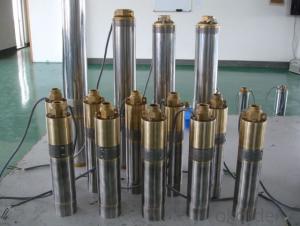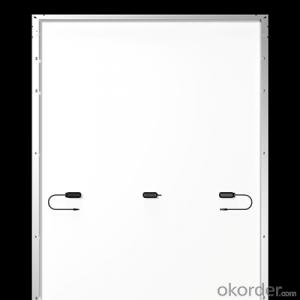AC solar pumping Systems
- Loading Port:
- Shekou
- Payment Terms:
- TT OR LC
- Min Order Qty:
- -
- Supply Capability:
- 100000000000000000000 /month
OKorder Service Pledge
OKorder Financial Service
You Might Also Like
Products
Solar Pumping System supplied by Shenzhen Solartech Renewable Energy Company(manufacturer) can be applied to daily use (ground water), agricultural irrigation, forestry irrigation, desert control, pasture animal husbandry, water supply for islands, wastewater treatment engineering, and so on. Solartech” Solar water pump System is dispensed with energy storing devices, and stores water instead of electricity. It improves the reliability of the device, at the same time, it lowers the construction and maintenance costs of the irrigation system dramatically.
In recent years, with the promotion of the utilization of new energy resources, Solar Pumping System is more and more used in municipal engineering, city centre squares, parks, tourist sites, resorts and hotels, the landscapes and fountain irrigation systems in the residential areas.
Technical Features
Optimization of Single Pump System
A single solar irrigation system consists of only one pump, a power -matched solar array and an inverter . The aim of optimization is to reduce the amount of PV modules as much as possible on the premise of filling the requirement of head and capacity. The rotational speed of pump is regulated according to the irradiation on the solar array; when the sunlight reaches its peak, the pump runs at the rated speed, and the output approaches the peak power of the solar array; when the sunlight is less abundant, the speed of pump varies bellow the range of the rated speed; when the speed as low as the capacity becomes zero, the solar pumping system stops working. So, there are big differences between solar irriation systems and traditional pumping systems in system design, and the system should be optimized according to the requirements of head, capacity, and local conditions of sunlight.
•Determine the optimal average daily operating time and the range of speed governing.
•Choose the optimal head and capacity of the pump.
•Determine the maximum power of PV modules, the best working voltage and method of connection.
Optimization of Multi-pump Systems:
There are several pumps in a multi-pump system. The pumps can be driven either by only one high-power inverter, or by several matching inverters. In the case of large capacity demand, the operation of the multi-pump system is more flexible. By switching solar arrays and pumps, all of the pumps run in MPPT mode when the sunlight is abundant, while some pumps will be shut down and all solar arrays supply power intensively for the rest running pumps when irradiation is weak. Based on the optimization of single pump system, the range of speed can be further optimized, and the photovoltaic(PV) pumping system always works with high efficiency.
Product Specifications
Model | Rated Power ( kW ) | Rated Voltage ( V ) | Head ( M ) | Daily Flow ( ㎥/ D ) |
PS370 | 0.37 | 220 | 20-47 | 20-1 |
PS550 | 0.55 | 220 | 15-70 | 40-1 |
PS750 | 0.75 | 220 | 6-81 | 100-1 |
PS1100 | 1.1 | 220 | 8-93 | 100-1 |
PS1500 | 1.5 | 220 | 7-128 | 130-1 |
PS2200 | 2.2 | 380 | 12-163 | 130-1 |
PS3000 | 3 | 380 | 9-187 | 250-10 |
PS4000 | 4 | 380 | 6-225 | 500-10 |
PS5500 | 5.5 | 380 | 10-172 | 500-20 |
PS7500 | 7.5 | 380 | 15-237 | 500-20 |
PS9200 | 9.2 | 380 | 20-140 | 500-40 |
PS11000 | 11 | 380 | 23-159 | 500-40 |
PS13000 | 13 | 380 | 27-189 | 500-40 |
PS15000 | 15 | 380 | 31-208 | 500-40 |
PS18500 | 18.5 | 380 | 39-143 | 500-100 |
PS22000 | 22 | 380 | 25-86 | 700-210 |
PS26000 | 26 | 380 | 30-105 | 700-210 |
PS30000 | 30 | 380 | 35-125 | 700-210 |
PS37000 | 37 | 380 | 40-150 | 700-210 |
PS45000 | 45 | 380 | 50-180 | 700-210 |
PS55000 | 55 | 380 | 65-200 | 700-210 |
- Q:How does a solar pump handle water pressure?
- A solar pump handles water pressure by utilizing the power generated from solar panels to operate a motor or pump. The pump is designed to handle the specific water pressure requirements of the system, ensuring efficient water delivery while maintaining the necessary pressure levels.
- Q:Do solar pumps require regular maintenance?
- Yes, solar pumps do require regular maintenance. This includes cleaning the solar panels to ensure maximum sunlight absorption, checking and replacing any worn-out parts, inspecting the pump's performance, and ensuring proper functioning of the system. Regular maintenance helps to prolong the lifespan of the solar pump and ensures optimal efficiency.
- Q:Can a solar pump be used in areas with high temperatures?
- Yes, a solar pump can be used in areas with high temperatures. Solar pumps are designed to withstand and operate in various climatic conditions, including high temperatures. They are equipped with heat-resistant materials and components that enable them to maintain optimal performance even in hot environments. Additionally, solar pumps utilize solar energy to power the pumping system, making them an ideal and sustainable solution for areas with high temperatures and ample sunlight.
- Q:Can a solar pump be used for water supply in mining or construction sites?
- Yes, a solar pump can be used for water supply in mining or construction sites. Solar pumps are especially suitable for remote locations where access to electricity is limited. They can effectively extract and transport water from various sources such as wells, rivers, or ponds, providing a reliable and sustainable water supply for mining or construction operations. Additionally, solar pumps are cost-effective, environmentally friendly, and require minimal maintenance, making them a suitable choice for these types of sites.
- Q:Can a solar pump be used for wastewater treatment or disposal?
- Yes, a solar pump can be used for wastewater treatment or disposal. Solar pumps are capable of extracting and transferring wastewater from one location to another, allowing for effective treatment or disposal processes. Solar-powered systems offer a sustainable and environmentally friendly solution for managing wastewater, especially in areas without access to electricity grids.
- Q:Can a solar pump be used in a well?
- Yes, a solar pump can be used in a well. Solar pumps are specifically designed to operate using solar energy, making them a sustainable and cost-effective option for pumping water from wells. They harness the power of the sun to generate electricity, which is then used to power the pump and draw water from the well. This eliminates the need for traditional electricity or fuel sources, making solar pumps an excellent choice for remote or off-grid areas where access to electricity may be limited.
- Q:Are there any restrictions or regulations for installing a solar pump?
- Yes, there are certain restrictions and regulations for installing a solar pump. The specific regulations may vary depending on the country, state, or local municipality where the installation is taking place. Some common restrictions and regulations include obtaining necessary permits and approvals, complying with building codes, adhering to safety standards, and following environmental guidelines. In many cases, installing a solar pump requires obtaining permits from the relevant authorities. These permits ensure that the installation meets certain safety, quality, and environmental standards. The process may involve submitting documentation, such as engineering plans and specifications, to the appropriate government department or agency. Building codes also play a significant role in the installation of a solar pump. These codes outline the technical requirements and standards for various aspects of the installation, such as the structural integrity of the mounting system, electrical wiring, and plumbing connections. Compliance with building codes ensures that the installation is safe and durable. Safety standards are crucial to protect the individuals involved in the installation process as well as the end-users of the solar pump system. These standards may cover aspects such as electrical safety, proper grounding, and protection against potential hazards. In addition to safety, environmental guidelines are also important when installing a solar pump. These guidelines aim to minimize the environmental impact of the installation and ensure the sustainable use of natural resources. For example, there may be restrictions on drilling boreholes or extracting water from protected areas. It is essential to consult with local authorities, solar pump manufacturers, and experienced professionals to understand and comply with the specific restrictions and regulations in your area. By doing so, you can ensure a smooth and legally compliant installation process for your solar pump system.
- Q:Can a solar pump be used for fish farming?
- Yes, a solar pump can be used for fish farming. Solar pumps are an environmentally friendly and cost-effective solution for providing aeration and water circulation in fish ponds. They can help maintain optimal oxygen levels, improve water quality, and enhance the overall health and growth of the fish. Additionally, solar-powered systems can be easily installed in remote locations without the need for electrical infrastructure, making them suitable for fish farming in rural areas.
- Q:Can a solar pump be used for water treatment systems?
- Yes, a solar pump can be used for water treatment systems. Solar pumps are an environmentally friendly and cost-effective solution for pumping water in remote areas where electricity is not easily accessible. These pumps use solar energy to power their operations, eliminating the need for traditional energy sources like electricity or fossil fuels. By harnessing the power of the sun, solar pumps can effectively pump water for various applications, including water treatment systems. Solar pumps can be used to supply water to filtration units, disinfection systems, and other water treatment processes. They are particularly useful in areas with limited access to clean water, as they can provide a sustainable and reliable source of water for treatment. Additionally, solar pumps require minimal maintenance and have a long lifespan, making them a practical choice for water treatment systems in both rural and urban areas.
- Q:How does a solar pump help in reducing the risk of electrical accidents?
- A solar pump helps in reducing the risk of electrical accidents by operating solely on solar power, eliminating the need for electrical connections and wiring. This eliminates the risk of electrical shocks or short circuits, making it a safer alternative for both users and the environment.
1. Manufacturer Overview |
|
|---|---|
| Location | |
| Year Established | |
| Annual Output Value | |
| Main Markets | |
| Company Certifications | |
2. Manufacturer Certificates |
|
|---|---|
| a) Certification Name | |
| Range | |
| Reference | |
| Validity Period | |
3. Manufacturer Capability |
|
|---|---|
| a)Trade Capacity | |
| Nearest Port | |
| Export Percentage | |
| No.of Employees in Trade Department | |
| Language Spoken: | |
| b)Factory Information | |
| Factory Size: | |
| No. of Production Lines | |
| Contract Manufacturing | |
| Product Price Range | |
Send your message to us
AC solar pumping Systems
- Loading Port:
- Shekou
- Payment Terms:
- TT OR LC
- Min Order Qty:
- -
- Supply Capability:
- 100000000000000000000 /month
OKorder Service Pledge
OKorder Financial Service
Similar products
New products
Hot products
Hot Searches
Related keywords


























